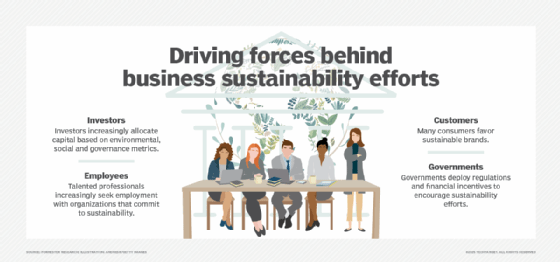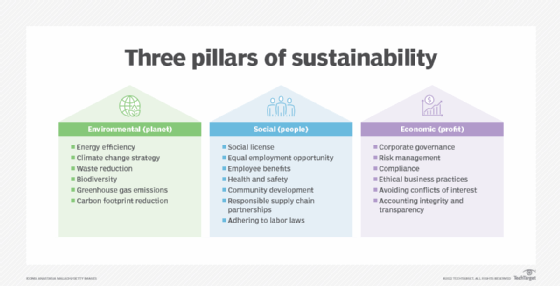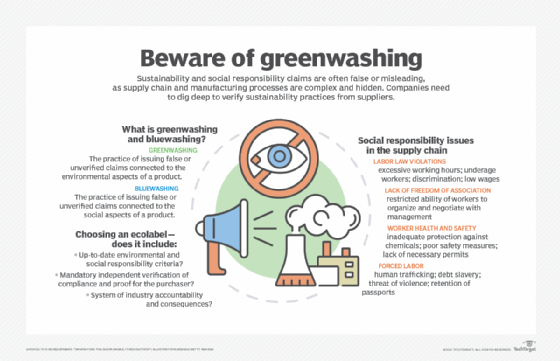What is business sustainability?
Business sustainability, also known as corporate sustainability, is the management of environmental, social and financial concerns by a company to ensure responsible, ethical and ongoing success.
In traditional corporate culture, social and environmental concerns are often considered to be in conflict with financial goals -- for example, if the use of nonrenewable natural resources isn't a sustainable practice. However, because greener alternatives typically require new investments in infrastructure, continued reliance on fossil fuels is the least expensive short-term option for energy usage.
In the long run, though, going green can increase a company's sustainability by reducing its energy costs, carbon footprint and climate-related business risks. Similarly, investment in socially responsible and ethical practices might initially cost more money. But it enhances recruitment, branding and public relations opportunities, and it, ultimately, can increase profitability.
Why is business sustainability important?
Businesses that incorporate sustainability practices find they resolve or mitigate environmental, social and economic challenges. The strategic management of corporate resources improves the effect a company has on the external world. In return, the business generates goodwill with customers, employees, community members, investors and other stakeholders.
This article is part of
ESG strategy and management guide for businesses
Five key areas of where business sustainability has important effects include the following:
- Environmental impact. Businesses that are conscientious about pollution, waste, emissions and excessive resource use minimize detrimental effects on the planet. Those include air pollution, which the World Health Organization estimates accounts for 43% of deaths and disease from chronic obstructive pulmonary disease. Efforts to minimize pollution appeal to customers, clients, employees and other stakeholders who prioritize the environment.
- Investor appeal. A business sustainability program can lower costs, increase revenue and profits, and promote the long-term financial performance of the organization. A IBM Institute for Business Value survey of 5,000 C-suite executives found that 75% said sustainability efforts drive better business results and 72% said they were revenue enablers rather than cost centers. If a company spends less on electricity, water and other resources, it can increase profits. Sustainable practices also contribute to an organization's overall resilience and ability to withstand environmental disasters and cope with transformative change. Such positive impacts, attract shareholders and people interested in sustainable investing.
- Consumer appeal. Companies are advised to regularly publish sustainability goals and report on their progress toward reaching them. This transparency helps consumers and others outside the organization understand how the business is contributing to a sustainable global economy. In addition, these progress reports help maintain trust with stakeholders and can enhance a company's reputation.
- Employee appeal. Companies that communicate well about their sustainability initiatives can benefit from a positive reputation that attracts socially aware employees. According to the "Bupa Wellbeing Index 2023," 42% of 8,000 UK-based people surveyed would be willing to accept lower pay to work for sustainable organizations.
- Governmental compliance. More laws and regulations are being implemented requiring companies to disclose the environmental risks their operations and facilities pose and to mitigate them. Business sustainability practices ensure companies are acting in accordance with existing laws and regulations. They also help organizations prepare for new rules and regulations in the future.

Business sustainability has been incorporated into other business movements. For example, kaizen is a philosophy of continuous improvement that aims to reduce manufacturing and business processes waste through a focus on quality control and productivity. Implementing sustainability efforts also build more resilient supply chains, increasing efficiency and improving cost management.
What are the 3 types of sustainability?
Environmental, social and economic demands are considered the three pillars of business sustainability. In the corporate world, they're sometimes referred to as the triple bottom line, a sustainability-focused framework for assessing a company's environmental, social and economic impact. This is a departure from the traditional concept of the bottom line, which evaluates all efforts in terms of their short-term effect on profits.
The three main pillars of sustainability are the following:
- Environmental sustainability gets the most attention from businesses. It requires companies to focus on improving energy efficiency in data centers and other facilities as well as reduce their environmental footprint, packaging waste and water use, among other environmental issues.
- Social sustainability focuses on corporate social responsibility and being a business that customers, surrounding communities, employees and investors want to support. Companies practicing social sustainability adopt fair labor practices and invest in long-term community relationships by giving back to local communities, among other steps.
- Economic sustainability focuses on long-term business profitability and includes activities such as corporate governance, risk management, regulatory compliance, ethical business practices and accounting transparency.
These three categories are commonly referred to by the acronym ESG, or environmental, social and governance. ESG is another framework that helps companies document their sustainable business practices, progress and related risks and opportunities as part of business sustainability efforts. Businesses can then measure their success in these areas using various ESG metrics and report the results publicly. ESG rating agencies use the disclosures and other data to give companies ESG scores, which investors and other stakeholders can consider in evaluating organizations.

How to create a sustainable business strategy
While there's no one right way to practice sustainable development, organizations can follow these best practices:
- Address compliance. Companies need to pay attention to and meet compliance requirements regarding waste management, pollution and energy efficiency as well as regulations related to corporate governance, such as the Sarbanes-Oxley Act in the U.S. and the European Union's General Data Protection Regulation. Failing to adhere to these regulations can result in fines and reputational damage.
- Align overall business strategy with sustainability. Contrary to traditional ways of thinking, sustainability isn't at odds with higher profits or a maintain a competitive edge over business rivals. Sustainability -- social, environmental and economic -- is essential for long-term success. Businesses should strive to exceed compliance and use sustainability to their competitive advantage.
- Quantify results and return on investment. Businesses should quantify sustainability ROI to make progress easier to track. For example, for compliance-based sustainability initiatives, regulations typically outline a preset framework to help businesses measure their progress. Various ESG reporting frameworks and standards are also available to use. It's generally more difficult for businesses to independently define a framework that measures sustainability with the goal of achieving a competitive advantage once base-level compliance requirements are met.
- Be proactive. Anticipate potential areas of improvement and build them into the sustainability strategy and decision-making before they become a problem. While most companies understand the importance of sustainability, not all are proactive.
- Be transparent. Disclosures about a company's sustainability strategy must be shared with the board of directors, business leaders, shareholders, customers, employees and surrounding communities. Businesses should also be forthcoming about where improvements are required and their plans to address that.
- Collaborate. Work with other organizations -- suppliers and business partners, for example -- to jointly develop plans to address larger economic, environmental and social problems.
Challenges with business sustainability
Common challenges with business sustainability to be aware of include the following:
- Data availability. A business sustainability strategy requires a clear understanding of existing operations. Data on these operations must be located from many sources within an organization. This can mean looking through large volumes of data stored in databases or locating and talking with employees who oversee managing relevant data.
- Tools and talent shortfalls. In-house expertise, data analytics capabilities and visualization tools are crucial to a successful sustainability effort. However, sustainability experts are in short supply, and the right tools can be difficult to identify and deploy without significant upfront costs.
- Lack of unified standards and governance. Multiple standards and frameworks exist, and the state of laws and regulations is evolving. Companies must research and understand the many different standards and regulations as well as find ways to coordinate their responses.
- Long-term planning. While it's easy to set short-term goals, it's difficult to plan long-term goals given uncertainty about the future. Companies must understand customers' needs and consider sustainability concerns to form long-term relationships.
- Greenwashing risks. Businesses must be mindful not to engage in greenwashing. These are practices where organizations falsely claim they've implemented sustainability efforts that yield positive results even when they don't.

Examples of business sustainability goals and objectives
Long-term business models with sustainability goals require an extended timeline for ROI. However, once initial investment is made, it can lead to increased profitability. Examples include the following:
- Data center cooling. Free cooling for data centers takes advantage of natural cooling methods to control temperatures in IT facilities. Investing in such approaches can require an initial cash outlay. However, free cooling relies on renewable energy resources that are freely available and reliable, which can eventually pay off for the business.
- Carbon offsetting. Another business sustainability practice is carbon offsetting. Businesses use carbon offsets to register their emissions and offset them by reducing emissions elsewhere in the world. For example, an airline might generate a certain amount of greenhouse gas emissions, which are recorded and then offset in other parts of the world via forestry, landfill gas capture, or solar and wind projects. Businesses can receive credits for offsetting carbon emissions to validate their efforts. However, such initiatives can be considered greenwashing if the company overstates its environmental contributions.
- Net-zero pledges. Another way to achieve environmental sustainability in the enterprise is to embrace net-zero emissions both internally and across supply chains. Examples of how organizations do this include using electronic vehicles or transitioning to environmentally friendly, low-impact refrigerants. Many sustainable companies, including H&M Group, Ikea, Nestle, Unilever and Walmart, have pledged to achieve net-zero carbon emissions in the coming decades.
- Waste reduction. Waste management is a key priority to improve an organization's environmental impact. Ways to do this include efficient use of raw materials and natural resources, such as water, to reduce waste.
- Green supply chains. Every aspect of a supply chain can be optimized for sustainability, including manufacturing materials, goods packaging and energy-efficient transportation modes.
The future of business sustainability
Current trends in business sustainability are expected to continue in the future. Artificial intelligence, data analytics and internet of things technologies will be used to monitor resource use as well as reduce waste and emissions. Additionally, blockchain technology will be applied to sustainability efforts to increase supply chain transparency, track goods and ensure all parties involved are operating sustainably.
More companies will outwardly express interest in sustainable operations, environmental protection and climate change issues. Current and future generations of customers are expected to be more aware of sustainability. To compete for their attention, companies will need a plan of action. However, the burden will be on them to prove this interest with tangible results. Therefore, efforts to produce reports proving sustainable processes will increase.
Consulting and research firm Governance & Accountability Institute conducted research showing that 90% of Russell 1000 companies published sustainability reports in 2022, up from 81% in 2021. This shows that business sustainability is no longer a buzzword or marketing term but, rather, a serious effort by companies to improve how they operate.
Learn more about the potential business benefits of sustainability and ESG initiatives for companies.